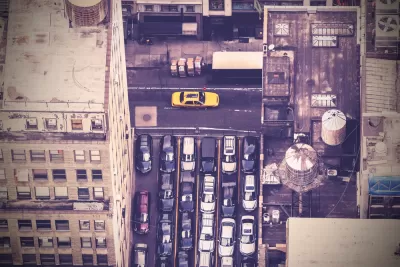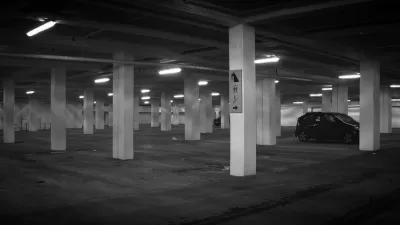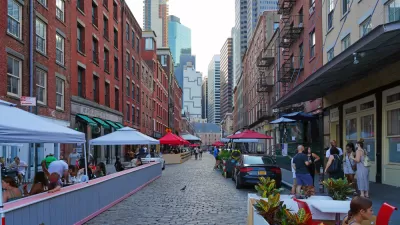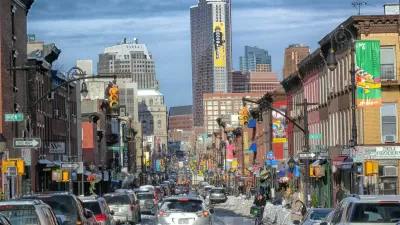With car ownership rates soaring, the fight for the city's free street parking spots is intensifying.

According to an article by Christina Golbaum in The New York Times, New York City's parking woes are reaching a fever pitch as more and more New Yorkers are buying cars and avoiding public transit at the same time as the city has converted 10,000 curbside parking spaces into outdoor dining space during the pandemic. Finding a place to park that newly purchased vehicle has become a formidable—sometimes insurmountable—challenge, according to the car owners quote by Goldbaum.
Car registration in Manhattan rose by 76% between last August and October, signaling a huge growth in the number of vehicles (and necessary parking spots) in the famously dense and crowded city. Residents have taken to blocking off their preferred spots with orange cones and waiting for hours to pounce on available parking as soon as it's cleared by street sweepers. Of the city's close to 3 million street parking spaces, most are free, and New York has never instituted the permit parking systems that many other cities use to control residential street parking. Residents sometimes have to circle for hours to find a spot near their home or pay close to $300 a month for a secured parking space.
Bike and transit advocates don't have much sympathy for the plight of car owners, writes Goldbaum. They claim that the parking scarcity simply underscores the city's "misguided subsidy of car culture" and points to the need to increase other mode shares. Danny Harris, executive director of Transportation Alternatives, dismisses the complaints about lost parking spots. "I’m sorry for your inconvenience but our entire city benefits when you give streets back to people," Harris told Goldbaum.
FULL STORY: Why the Fight Over Parking in New York Is ‘Like the Hunger Games’

Maui's Vacation Rental Debate Turns Ugly
Verbal attacks, misinformation campaigns and fistfights plague a high-stakes debate to convert thousands of vacation rentals into long-term housing.

Planetizen Federal Action Tracker
A weekly monitor of how Trump’s orders and actions are impacting planners and planning in America.

In Urban Planning, AI Prompting Could be the New Design Thinking
Creativity has long been key to great urban design. What if we see AI as our new creative partner?

Florida Seniors Face Rising Homelessness Risk
High housing costs are pushing more seniors, many of them on a fixed income, into homelessness.

Massachusetts Budget Helps Close MBTA Budget Gap
The budget signed by Gov. Maura Healey includes $470 million in MBTA funding for the next fiscal year.

Milwaukee Launches Vision Zero Plan
Seven years after the city signed its Complete Streets Policy, the city is doubling down on its efforts to eliminate traffic deaths.
Urban Design for Planners 1: Software Tools
This six-course series explores essential urban design concepts using open source software and equips planners with the tools they need to participate fully in the urban design process.
Planning for Universal Design
Learn the tools for implementing Universal Design in planning regulations.
Gallatin County Department of Planning & Community Development
Heyer Gruel & Associates PA
JM Goldson LLC
City of Camden Redevelopment Agency
City of Astoria
Transportation Research & Education Center (TREC) at Portland State University
Jefferson Parish Government
Camden Redevelopment Agency
City of Claremont





























